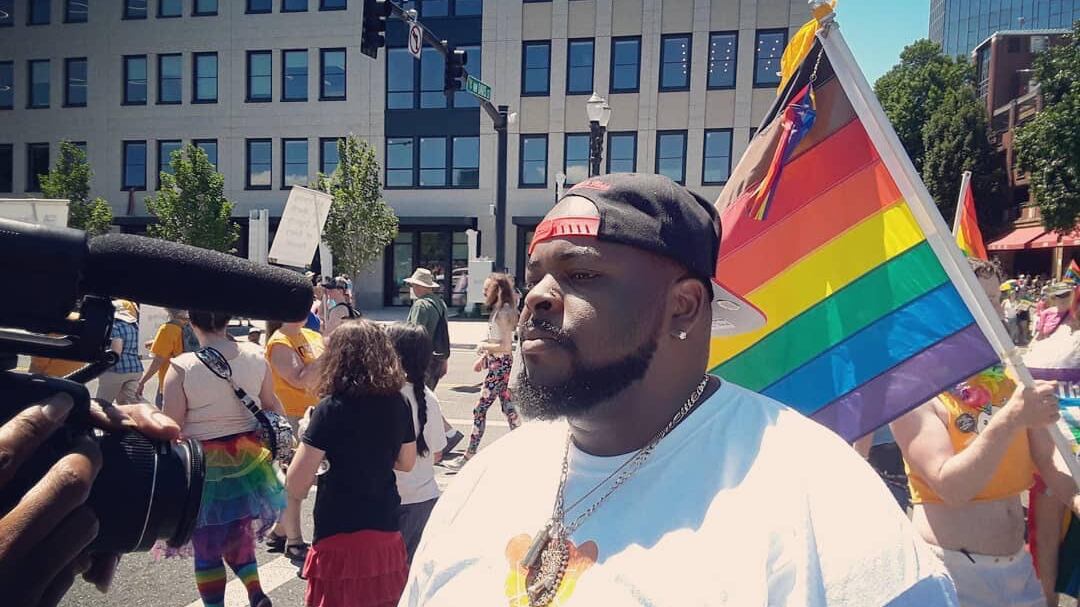Trish Perry has a dream—she wants to see a Pride parade in her hometown of Bend.
At a glance, that hardly seems like an impossible goal. After all, Bend is one of the fastest-growing cities not just in Oregon but the entire United States, and there's already a Pride celebration that happens in downtown's Drake Park.
But Perry, who sits on the board of the queer advocacy group the Human Dignity Coalition and helps plan Central Oregon Pride, says she's been fighting an uphill battle.
She's had to deal with a lack of media support and gay-friendly gathering spaces, as well as baldfaced bigotry—during last year's Central Oregon Pride, fliers equating queer people to pedophiles were plastered around the city.
But it's not just the straight, conservative power structure creating hurdles.
Perry also says Portland entertainers have canceled paid gigs in favor of larger, out-of-state Pride parties, and that organizations like Basic Rights Oregon and the Human Rights Campaign don't return the favors they ask of queer organizers in the state's more rural areas.
"[BRO and HRC] have us speak for them as a local charity, and help them make a bunch of money, because there's a lot of money in this community to filter," Perry says. "But they won't donate any of it back for us coming to speak for them, while we're doing the work in this community. It all goes back to Portland, and we're sitting here going, 'OK, we've still got these issues we're working hard on, we're all unpaid volunteers. Help a sister community out.'"

In Portland, it's easy to take Pride for granted. But there are still many communities across the country where exhibitions of queer visibility are still a new concept, including in Oregon. And in many cases, discrimination is less of an impediment than a sheer lack of resources.
"I think people who aren't from more rural areas don't realize that it's not necessarily outright homophobia that we have to deal with so much as just feeling invisible," says the president of the Mountain Queers club at Eastern Oregon University in La Grande, who goes by C. "We've got queer people, of course, but the sort of thing that Mountain Queers is doing where we're just out there, not being subtle, celebrating our existence, is something you don't really see in Eastern Oregon much, and that's why we're doing it."
But while many rural queer communities struggle just to be seen, both within their towns and by the wider Oregon LGBTQ community, several have made notable strides.
For Mountain Queers, this year's Pride event represents significant growth. Last year, the group only had enough funding for a single dance. This year's celebration, though, will be the college's largest in recent memory.
Events include a film screening, Q&A panel, art meetups and another dance. In addition, La Grande will have its first Pride parade after a long hiatus—the result of networking, fundraising and community-building over the past year.
"Our small but passionate group is the inheritor of the hard work of many queer people and allies that fought for the building space and resources we have at Eastern Oregon University," said Mountain Queers secretary Joel Chin. "The administration barely tolerates us, and the best we can hope for most of the time is the frightened, averted gaze of a lot of the people who grew up in this area and simply lack diversity in their social circles."
On the coast, Yachats Pride is between 80 and 150 miles away from the next nearest event. It started in 2017, partly in response to the shooting at Orlando's Pulse Nightclub the year prior, serves not only its town but the entire coastal region between Astoria and Coos Bay.
According to planning committee co-chair Helen Anderson, Yachats Pride brings out upward of 400 people—a not-insignificant number, considering the town hosts an average of 700 people at the height of tourist season. The 2019 edition features everything from Two-Spirit members of the Siletz Nation to nationally touring drag queens.
"The community is very supportive of Pride and of LGBTQ folks in general," Anderson says. "We want Yachats Pride to be a conduit for linking the LGBTQ community along the Central Coast."
Meanwhile, Trish Perry is still dreaming of a Pride parade in Bend. But at least one Portland artist is looking forward to performing at this year's party.
Roulette Delgato is a Portland rapper who did not grow up near other LGBTQ people. He was born during his mother's prison sentence, and came out as a gay man on a 2014 Divorce Court episode.
Central Oregon Pride will be his first-ever Pride performance. Delgato hopes to share his music and story with queer people of color who may feel even more intense isolation than their white rural peers.
"I feel like I have so much work to do," Delgato says. "I want to not only defeat the stigmas of homosexuality, but also break the color lines and promote love, peace, acceptance, and equality for all."

How a Classified Ad in an Underground Newspaper Ignited Portland's LGBTQ Rights Movement
Eight Portland LGBTQ Nonprofits
